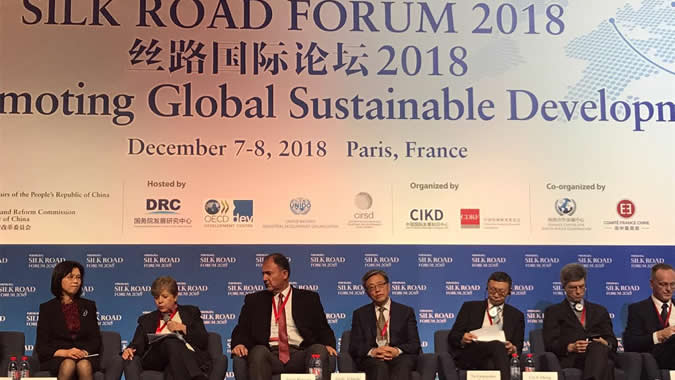Chinese Belt and Road Initiative is an Opportunity for Inclusive and Sustainable Investments: ECLAC
Work area(s)
The organization’s Executive Secretary, Alicia Bárcena, made a presentation in France at the fourth Silk Road Forum regarding the benefits that this collective platform could contribute to fulfillment of the 2030 Agenda and the Paris Agreement.

The Executive Secretary of the Economic Commission for Latin America and the Caribbean (ECLAC), Alicia Bárcena, highlighted today in Paris, France that the Chinese-led Belt and Road Initiative (BRI) could be a significant opportunity to promote inclusive and sustainable investments.
This Friday, December 7, Bárcena made a presentation at the fourth Silk Road Forum, held in the French capital by the China Center for International Knowledge on Development (CIKD) and the China Development Research Foundation (CDRF), with the support of the Ministry of Foreign Affairs of the People’s Republic of China and the Development Research Center (DRC) of the State Council of the People’s Republic of China.
According to the senior United Nations official, the region of Latin America and the Caribbean views the BRI with great interest since it offers the opportunity to diversify and improve the quality of its economic links with China and, more specifically, it can help attract much-needed investment in infrastructure, industry and services.
“While trade between China and Latin America and the Caribbean expanded 22 times over in the last eight years, the Belt and Road Initiative is a significant opportunity to attract inclusive and sustainable investments, and to strengthen the digital and trade connectivity between both sides, beyond the exportation of commodities,” Alicia Bárcena indicated.
Currently, China is the region’s second most important trading partner, and it is South America’s top-ranking partner. Two-way merchandise trade with China exceeded $280 billion dollars in 2017, according to data compiled by ECLAC.
“For our region, now is the time to define the specific projects that could be carried out within the framework of the BRI and the modalities for their financing and implementation, always ensuring that benefits are tangible and mutually shared. ECLAC stands ready to assist in this important endeavor,” Bárcena stated.
ECLAC’s Executive Secretary highlighted in her presentation that the tectonic changes that have occurred in the world in recent decades, with a rise in protectionism and an increasingly sharp questioning of globalization, have threatened the multilateral system.
However, she noted, “maintaining an open, multilateral and rules-based trading system is key to the implementation of the 2030 Agenda for Sustainable Development, its goals (SDGs) and the Paris Agreement on climate change.”
She recalled that last January in Santiago, Chile, China officially invited Latin America and the Caribbean to be a part of the BRI. Since then, more than ten countries in the region have signed Memorandums of Understanding with the Asian country (including Chile, Bolivia, Costa Rica, the Dominican Republic, Panama, Uruguay, Venezuela and several Caribbean nations).
In addition to Alicia Bárcena, other prominent figures participated in the Silk Road Forum’s panel addressing “BRI and the Open World Economy,” including economist Jeffrey Sachs, Professor at Columbia University and Special Advisor to the United Nations Secretary-General António Guterres; Tu Guangshao, Vice Chairman and President of the China Investment Corporation (CIC); Jorge Arbache, Vice President for Private Sector at the Development Bank of Latin America (CAF); Bert Hofman, the World Bank’s Country Director for China, Mongolia and Korea; and Pavel Kadochnikov, Vice-Rector for Research at the Russian Foreign Trade Academy of the Ministry of Economic Development of the Russian Federation.
Type
Country(ies)
-
China
- Latin America and the Caribbean
Contact
Public Information Unit
- prensa@cepal.org
- (56 2) 2210 2040